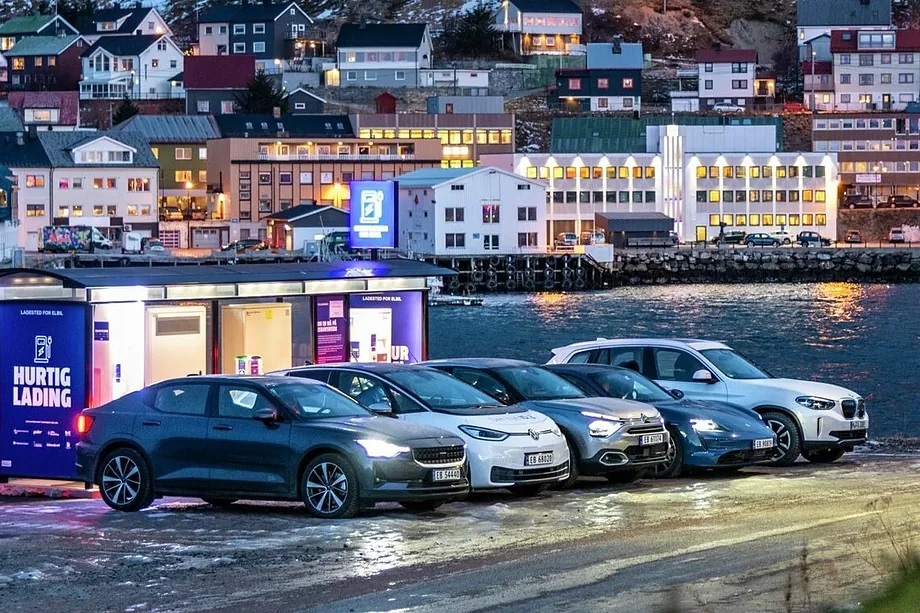Four years ago, Norway became the first country in the world where sales of pure electric cars surpassed combustion ones. In January, they nearly reached 100%, the goal set by the country's authorities for this year, a decade earlier than the EU's target, of which, by the way, Norway is not a part.
Specifically, out of the 9,343 cars sold last month, 95.8% were solely powered by electricity stored in their batteries, according to data from the Norwegian Public Roads Administration (OFV) and reported by the AFP agency.
This unprecedented milestone was reflected in more surprising data. Out of the 50 best-selling models, only two had combustion engines, with the first one appearing in the 33rd position on a list led by the Toyota bZ4x, with 1,188 units, followed by the Volkswagen ID.4 (830 registrations) and the Nissan Ariya (544 cars).
Top 10 in Norway in January 2025
Meanwhile, Volkswagen solidified its position as the top brand, with 1,899 units. Toyota (1,354) and Tesla (689 units) were second and third, respectively. This marks a significant change from the 2024 statistics. Back then, Norwegians bought 114,396 electric cars (89% of the total in the country and 7.6% of all electric cars sold in Europe) and the manufacturer led by Elon Musk sold nearly one out of every five, with 24,259 units, compared to Volkswagen's 14,000.
"We have never seen anything like this before... If the rest of the year continues like January, we will be very close to the 2025 target," stated Øyvind Solberg Thorsen, director of the OFV, in a press release.
Regarding Tesla's performance, there is no evidence that Musk's approach to Donald Trump has harmed him, but a study conducted in neighboring Sweden -where the company had a notable social conflict with unions in 2024- shows a tarnished image. According to a mid-January survey by Novus, 69% of the 1,002 respondents have a negative opinion of Musk, and 47% feel the same about Tesla. Positive sentiments are only at 10% and 19%, respectively.
These sentiments are also emerging in other markets like the UK, the Netherlands, and even in California. For years, the state of California (long held by Democrats) has been one of Tesla's major markets. However, despite still dominating the market there, its sales decreased by 12% in 2024, with 24,000 fewer cars sold.
Norway - paradoxically the largest exporter of hydrocarbons in Western Europe - has reached this point without banning combustion engines. Instead, they have followed the principle of "the polluter pays." Thus, while electric cars have been largely tax-free, combustion vehicles bear a heavy tax burden to make their purchase less attractive and balance public finances.
They have also benefited from other privileges, such as free urban tolls, parking in public lots, or access to exclusive lanes for buses. These advantages, which various governments began implementing in the 1990s, have eroded somewhat over time, but fully electric vehicles have become common in the country and now represent up to 27% of the circulating fleet.
Lastly, the willingness of citizens to acquire these zero-emission vehicles has also played a role.
Closer to home, similar strategies help explain how Portugal, with a lower per capita income than Spain, achieved an electric car penetration rate of nearly 20% in 2024. The EU average was 13.6%, while Spain lagged behind at a mere 5.6%.
Nationally, the Scandinavian country with its harsh winters has established a network of ultra-fast chargers that alleviate range anxiety. "Now that the network is so developed, it's less complicated. Planning the route is no longer as necessary as before," explained Frode Hvattum, who, like many Norwegians, often visits his mountain cabin just a few hours from Oslo.
In this regard, the latest Electromobility Barometer by the Spanish automotive industry association Anfac ranks the Nordic country as the most advanced in Europe, with a score of 107.3 points (out of 100) considering the market penetration of electric models and the charging network development. In the EU27 territory, the score is 29, and in Spain, 15.5.
The push towards 100% market share this year will be aided by even stronger taxes on internal combustion engines and plug-in hybrids starting April 1, which should further accentuate the trends.
According to the OFV, diesel accounted for only 1.5% of new registrations in January, and gasoline for 0.4%. Out of the 389 new vehicles with internal combustion engines sold in January, only 148 were to private individuals, "people living in areas with long distances and unstable weather conditions who opt for this alternative simply to feel safe when traveling," stated Nils Sødal, spokesperson for the Norwegian Automobile Association (NAF). The rest were acquired by rental companies, taxi services, local authorities, or driving schools.
However, authorities must not rest on their laurels: "We must maintain usage advantages, such as discounts on urban tolls, so that the transition to electric vehicles also occurs in the second-hand market," emphasized the OFV.
